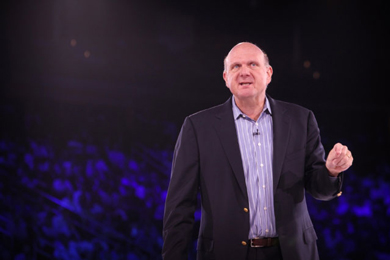News
Ballmer Resigns from Microsoft's Board of Directors
- By Gladys Rama
- August 19, 2014
Former Microsoft CEO Steve Ballmer is stepping down from the company's board of directors effective Aug. 19.
Ballmer, who has been with Microsoft for 34 years and served as its CEO for 14 before retiring early this year, announced that he was leaving the board in a letter to current CEO Satya Nadella published Tuesday.
The announcement came just one day after Ballmer was feted as the new owner of the Los Angeles Clippers basketball team.
"In the six months since leaving, I have become very busy. I see a combination of the Clippers, civic contribution, teaching and study taking a lot of time," Ballmer wrote, adding, "Given my confidence [in Microsoft's future] and the multitude of new commitments I am taking on now, I think it would be impractical for me to continue to serve on the board, and it is best for me to move off."
 Former Microsoft CEO Steve Ballmer at the 2013 Worldwide Partner Conference. (Source: Microsoft)
Former Microsoft CEO Steve Ballmer at the 2013 Worldwide Partner Conference. (Source: Microsoft)
With Ballmer's departure, Microsoft's board currently has 10 members, including Nadella, Co-Founder Bill Gates, Chairman John Thompson and recently added John Stanton.
As of Microsoft's latest proxy statement, Ballmer owned 333 million shares (just shy of 4 percent). He became the company's biggest individual shareholder in April, when Gates sold over 4 million shares. Ballmer intends to keep that top shareholder position, according to his letter.
"I hold more Microsoft shares than anyone other than index funds and love the mix of profits, investments and dividends returned in our stock. I expect to continue holding that position for the foreseeable future," he wrote.
Ballmer also expressed his confidence in Microsoft's direction under Nadella, who replaced him as CEO in February.
"No company in the world has the mix of software skills, cloud skills, and hardware skills we have assembled. We draw talent as well as any company in the world. We have the profitability to invest in long-term opportunities and still deliver superior shorter term performance. You're off to a bold and exciting start," he wrote.
He also alluded to adjustments Microsoft must make in the current technology landscape, invoking the "mobile-first, cloud-first" description that has become Nadella's mantra since taking the CEO role.
Microsoft's future success will depend on its ability to drive profit not just from its software business, but also from enterprise subscriptions, hardware and advertising, according to Ballmer.
"Making that change while also managing the existing software business well requires a boldness and fearlessness that I believe the management team has. Our board must also support and encourage that fearlessness for shareholders to get the best performance from Microsoft. You must drive that," Ballmer wrote.
In a letter responding to the announcement, Nadella said that he supported Ballmer's decision.
"Under your leadership, we created an incredible foundation that we continue to build on -- and Microsoft will thrive in the mobile-first, cloud-first world," Nadella wrote.